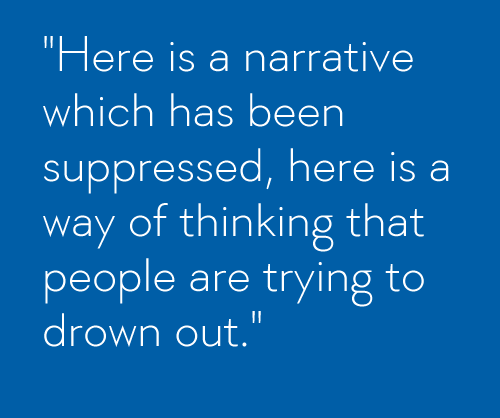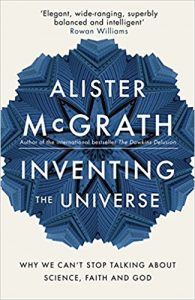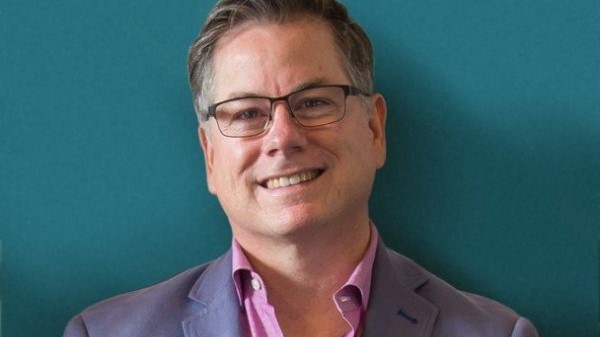Tell us about Inventing the Universe. What is it about, why did you write it, and who is it for?
I wrote it because I wanted to explain the kind of journey I made from being an atheist who thought that science explained everything, to being a Christian who sees science as filling in parts of a picture, but who sees that there is a bigger picture as well. So I am writing this for anyone who is interested in the whole area of science and faith, particularly for scientists who are Christians who want to articulate the way they think more clearly, or for other people who just want to know that there are ways of holding science and faith together.
Something of an intellectual autobiography as well, then?
Well, it is actually, yes! I’m saying that over a 40-year period, this is what I have come to think. This is what I have found my way towards, and if it helps others, I’ll be delighted!
In the book you refer to the “warfare model” of Science versus Christianity. Why do you think that it has come to dominate the public discourse, and created such a problem for allowing Christian apologetics to gain a fair hearing?
I think it’s become a defining narrative or our culture. In part, because it has been propagated by a media who tend to just repeat what everyone’s said in the past. But more importantly, I think New Atheism has made this conflict narrative normative. I think that when you have very influential cultural figures supporting this, it’s quite difficult to break that stranglehold. And so we need to tell a different story and show that it makes more sense and that it’s much more exciting and attractive.

How can we help people to hear Christian apologetics when their ‘plausibility structure’ has already told them that what we are saying is irrelevant?
Well what I think you need to do is to say, ‘look, here is a narrative which has been suppressed. Here is a way of thinking that people are trying to drown out’. They find it threatening, they find it challenging, and we need to say that they may not like it but they’ve got to hear it. They owe it to us to give us a hearing. I think that is something we need to say. CS Lewis, in his sermon The Weight of Glory, says that the dominant narrative in our culture is, ‘what you see is what you get’, and he says we have been ‘entranced’ by that, and we need to break that spell! And then he says the way of breaking a spell is by casting a better spell. What he means is presenting Christianity in an attractive, intelligible and an imaginatively compelling way, so that people stop and say, ‘we’ve got to think about this’. And we haven’t done that very well.
And the media is captured by the conflict model, which prevents people like you being heard at the public level, I suppose?
It’s become the dominant media narrative. Charles Taylor’s book, The Secular Age, talks about how this happens. The difficulty is that once a narrative takes root, anyone who contradicts it is seen as being irrational. And Taylor says that once that mindset develops it’s very hard to break it. We’ve got to see ourselves as a counter-culture, a fifth-column, (or something like that). We are subversives who are challenging the dominant narrative, firstly because it’s wrong, but secondly, because we’re pressing a much more meaningful and exciting narrative.
And your book is doing that?
Well, it’s a small step in that direction. Scholarship disproved this ‘conflict narrative’ a generation ago, but it’s taken ages for it to filter through to the media, who keep on repeating this old-fashioned, outdated approach.
The book made a lot of scientific ideas accessible to a non-scientist like me, which I found exciting.
Well, it is written for a general audience, although I think scientists will particularly like it. I’ve just been debating a leading British humanist and physicist, and actually we had an incredibly civil and interesting conversation, because basically my science is right! That makes it much harder for atheists to write it off. If you do that, it gets a really good conversation underway.
Interesting that you were speaking to a physicist. Is it harder to be a biologist who is a believer than a physicist?
I think the answer is ‘yes’, and that’s partly because if you think of someone like Richard Dawkins, biology has been ‘weaponised’, whereas physics has not. If anything, physics is going in the other direction. Physics is generally supportive of a theistic worldview. Biology, precisely because (if it’s interpreted in a certain way) seems to be anti-theistic, it is being seized upon and made into the weapon of choice by those who want to continue the conflict narrative and offer an atheist apologetic.
The idea of ‘multiple maps’ is important in the book. What are they?
What I mean is, science gives us one bit of the big picture – religion gives us another bit. We want to see the whole, and that means we need to recognise that science is going to tell us some things, but not others. You can approach things from only one perspective but that’s simply unacceptable because you leave out massive things like the issue of meaning, the issue of value and so on. The idea of ‘multiple maps’ ensures that you have a full palate of colours to do justice to the richness of the world, our experience and so on.
So ‘multiple maps’ challenges Christian fundamentalists, too?
Absolutely! What they’re doing is locking themselves into a very small area and are not able to dialogue with anyone beyond that. The method I’m adopting is a wonderful platform for apologetics because it is saying, ‘look, we can talk and have a very good conversation’. Christianity has a marvellous contribution to make, it cannot be ridiculed, it cannot be ignored; there is something very significant here which needs to be heard.
If ‘multiple maps’ are an important idea in the book, ‘scientism’ seems to be the major target. What do you mean by ‘scientism’?
Scientism is a non-scientific viewpoint which says that science answers all meaningful questions. So, science tells us what the meaning of life is, it tells us what is good and what is bad. Sam Harris, in his book The Moral Landscape, takes that line. My point is simply that this is an abuse of science! Science is science, you’ve got to make sure that you respect it, not convert it into something else. When science is done properly it has limits, and that is the best way of preserving its identity, its integrity. I am protesting strongly against those scientists who exaggerate the explanatory capacity of science.
So why does scientism persist?
It’s partly a power play because some scientists feel threatened by cultural developments which they see as marginalising themselves. But the real answer goes back to that conflict narrative. It sees intellectual history as a trajectory from the dark ages, to a modern, enlightenment period in which reason and science are the drivers of progress. Therefore, science is the guarantor of rationality and progress, and anything else, such as religion, is seen as backward and unhelpful. However, that is a worldview, not an empirical observation. That is the imposition of a worldview which science is being ‘weaponised’ to consolidate.
You write books faster than I can read them. Where is your research taking you next?
I get excited by things and love writing about them! Well, the next big book is going to be about human nature. It is going to be looking at scientific, cultural, and philosophical insights, and argue that there is a big problem in the naive enlightenment view of humanity, which still dominates Western culture, but there’s a better way of looking at it. It will be very sympathetic towards traditional Christian ideas of ‘The Image of God’ and sin and so on. So it will be absolutely rigorous, but at the same time it will bring a perspective which often isn’t heard. There is a major discussion underway right now about human nature that is essential to many political, social, and religious debates. It will be published around Easter 2017.
Alister McGrath is the Andreas Idreos Professor of Science and Religion at Oxford University, and Fellow of Harris Manchester College, Oxford. He is the author of many academic and theological works, as well as the bestselling The Dawkins Delusion and his acclaimed CS Lewis – A Life.
 Inventing the Universe, by Alister McGrath, is printed by Hodder and Stoughton and is available from leading bookstores and online, for £20.
Inventing the Universe, by Alister McGrath, is printed by Hodder and Stoughton and is available from leading bookstores and online, for £20.




 Dr. John Dickson
Dr. John Dickson
 Dave Bookless is Advisor for Theology and Churches for A Rocha International (www.arocha.org)
Dave Bookless is Advisor for Theology and Churches for A Rocha International (www.arocha.org)
